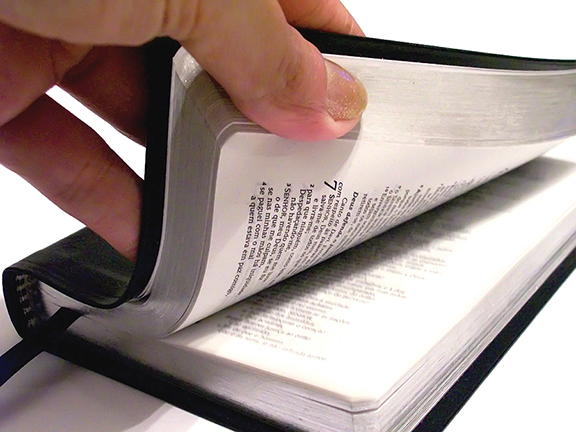Our study is a journey through our statements of faith found in This We Believe: Teachings of the Church of God (Seventh Day). Each article will explore two of our twelve statements. We begin now with Statements 1 and 2 on the Bible and Deity, summed up in the January-February 2018 issue as “Knowing God.” Is there anything more important or exciting than knowing our God? Paul considered all else rubbish in comparison: “That I may know Him . . .” (Philippians 3:10).
That we may know the Father and His Son, Jesus, and make them known by the Spirit, is our greatest privilege and mission. We rely on Scripture because we must know and reveal God as He is, not as we wish Him to be. Knowing Jesus rightly means following Him faithfully.
— Jason Overman
A journey begins through our statements of faith. The following excerpts are taken from This We Believe: Teachings of the Church of God (Seventh Day).
We recognize that Christianity is marked by diversity in understanding and doctrine. Our primary concern [is] not to argue for our beliefs or argue against the beliefs of others, but rather to clearly explain why we believe what we believe in light of Scripture. There is no sustained effort to disprove our detractors, or even to convince the skeptics. Rather, we desire to clearly explain what our Statement of Faith means and leave the convicting, teaching, and sanctifying work to the Holy Spirit.
Our desire is that this book will serve many purposes. . . . For the fellow Christian who represents a different denomination, it serves as a means of dialogue and information regarding our distinctive beliefs and practices. For those within our denomination, it serves to clarify, inform, encourage, and strengthen us in our shared convictions regarding Scripture.
From the Preface, page vii
Statement of Faith 1: The Holy Bible
This we believe: the Bible, consisting of the Old and New Testaments, is God’s inspired Word. Inerrant in its original writing, the Bible is the only authoritative and infallible rule of faith and conduct for humanity.
The Bible is a collection of sixty-six books written by more than thirty men under the inspiration of God’s Spirit over a period of nearly 1,500 years. This remarkable library of history, law, poetry, wisdom, gospel, letters, essays, and prophecies constitutes the Holy Scriptures of the Christian faith. The Bible forms the foundation of the Christian faith and church.
The word Bible derives from the Greek biblos, meaning “books.” Within it the following words are used in reference to itself: “the books” (Daniel 9:2), “the holy scriptures” (Romans 1:2; 2 Timothy 3:15), “Scripture” (2 Timothy 3:16; 2 Peter 1:20), “oracles of God” (Romans 3:2), and “word of righteousness” (Hebrews 5:13).
The object of our faith is not the Bible itself. A good book cannot save us, no matter how inspired and inspiring. Through the Bible we acquire the basis for faith to accept, believe, confess, and demonstrate by obedience that Jesus Christ is the true Savior and Lord. Thus the object of biblical faith is the holy and loving God who is revealed throughout Scripture and perfectly in Jesus Christ. In Him alone do we find the salvation that we need and long for (John 5:39, 40).
As the Lord Jesus Christ is the living Word of God (John 1:1-3, 14), so the Bible is God’s Word written. As inspired by and rightly interpreted through the Holy Spirit, the Bible is the only reliable authority for the faith and practice of God’s people.
Old and New
This Holy Book of books is divided into two main sections. The first section records the faith and sacred writings of God’s covenant people in the ages prior to the coming of the Messiah. These Scriptures, written primarily in the Hebrew language, are recognized by the Christian church as the Old Testament. Its thirty-nine books are in three categories: the five books of Moses, or Torah (Genesis through Deuteronomy); the Prophets (former prophets, Joshua through the Kings – commonly called books of history – and latter prophets, Isaiah through Malachi); and the Writings (Ruth, the Chronicles, Ezra, Nehemiah, Esther, Job, Psalms, Proverbs, Ecclesiastes, Song of Solomon, Lamentations, and Daniel). This division has been widely accepted among the Jews since before Jesus’ time and was acknowledged by Him in Luke 24:44.
The second section of twenty-seven books contains the sacred writings that are unique to faith in our Lord Jesus Christ. It is known as the New Testament, believed to be written in Greek. The New Testament is less than one third the length of the Old.
These two sections together form a unit that furnishes the written foundation for our faith. Each was revealed as the Word of God, and neither may be discarded without doing damage to the full revelation of God’s will for man. Both Testaments show us God’s election of Israel to dispense His word through prophets and bring through her lineage the incarnate Word to save our souls and complete the dispensation of His Word through the apostles (Hebrews 1:1, 2).
The central theme of the Bible is God’s message of salvation by grace through faith in His Son Jesus. In the Old Testament, this theme was announced through types and prophecies. In the New Testament, Jesus Christ the Son of God (Matthew 16:13-16) becomes historical reality as true man (Mark 6:1-4). Through the Scriptures God requires faith and obedience on the part of the reader, and provides for the same (Romans 10:17; Philippians 2:13).
The Old Testament is God’s Word indeed, although not His final Word. Those who read this first section, the Hebrew Scriptures, should continue in the words of our Lord Jesus and His apostles (New Testament), for it is in the latter that God’s grace and truth come to their fullest illumination and finest expression (John 1:17).
In the Old Testament, the New is concealed; in the New Testament, the Old is revealed. We must take care not to separate what God has joined — namely, the older and newer Scriptures that are combined in the Holy Bible.
From pages 2-3
Statement of Faith 2: The Deity
This we believe: the sovereign deity of the universe is God Almighty, who is to be worshiped in spirit and in truth. He is eternal, infinite, holy, self-existent Spirit who created, sustains, rules, redeems, and judges His creation. He is one in nature, essence and being. God is revealed in Scripture as Father and Son.
Attributes of God
God may be known by attributes that are intrinsic to His person. He is:
Almighty, sovereign: The term almighty, or omnipotent, means having absolute power over all things. “Holy, holy, holy is the Lord God Almighty, who was, and is, and is to come” (Revelation 4:8; see also Revelation 16:7 and Genesis 17:1). God’s sovereignty means that His authority is above all others; He has neither superior nor equal. The Lord is God; besides him there is no other. He reigns supreme (Deuteronomy 4:35; 10:17; Psalms 24:1, 10; I Timothy 6:15, 16).
Eternal: God is without beginning or end. He is unlimited by time and cannot die. “Now to the King eternal, immortal, invisible, the only God, be honor and glory for ever and ever” (1Timothy 1:17; see also Deuteronomy 33:27; Psalm 41:13; 90:2b).
Omnipresent, invisible spirit: “God is spirit . . .” (John 4:24). In His essential nature, God has none of the limitations of space and matter. His presence may be experienced anywhere and everywhere (Psalm 139:7-10; Jeremiah 23:24). To human eyes, He is invisible. “No one has ever seen God…” (John 1:18; 1 Timothy 1:17).
Holy: God’s holiness refers to His being separate and different from everything that is not God, from all things common. This is expressed throughout Scripture in many ways, particularly in the repeated refrain “Holy, holy, holy” that is descriptive of God alone (Revelation 4:8; see also Leviticus 19:2; Isaiah 6:3; and Luke 1:49).
Self-existent: In contrast to the dependent state of humans and all created things, God is independent of all others; He needs nothing. He will always remain unaltered, absolute Being. This is implied in His words to Moses: “I AM WHO I AM . . . say to the Israelites: ‘I AM has sent me to you’” (Exodus 3:14).
All-loving: God is love. His great love for all the world is demonstrated most dramatically in the offering of His only Son as a sacrifice for sin (John 3:16; Romans 5:8; Ephesians 1:4, 7; 1 John 2:1, 2).
One God, revealed as Father and Son
From start to finish, the Bible knows only one God. The Hebrew shema says it best: “Hear, O Israel: The Lord our God, the Lord is one” (Deuteronomy 6:4; see also Deuteronomy 4:35; 32:39; 2 Samuel 7:22; 1 Chronicles 17:20; Psalm 86:10; Isaiah 43:10; 44:6; 45:5, 14, 18; Mark 12:29; 1 Corinthians 8:4; Ephesians 4:6; 1 Timothy 2:5.
While Christianity is a monotheistic faith and our God is numerically one, the best biblical evidence points to the fact that He is uniplural in His divine person. Uniplural suggests that God is one in essence but more than one in expression. His uniplurality was fully revealed in the divine-human person of Jesus Christ, but was intimated throughout the Old Testament in various ways. For example:
- God’s occasional use of plural pronouns to refer to Himself (Genesis 1:26; 11:5-9; Isaiah 6:8)
- References to a divine Son (Psalm 2:7-12; Isaiah 9:6, 7; Daniel 3:25)
- Personification of the “Word of God” (Psalm 33:6; 107:20)
- The Hebrew words elohim (translated as “God” or “gods”) and adonai (translated as “Lord” or “lords”) may be references to the plurality of God’s nature, as well as to the plurality of His power and majesty.
- The Hebrew word echad (translated “one” in the shema of Deuteronomy 6:4) can refer to a composite, integrated whole, thus allowing for the uniplural nature of God.
From pages 12-14
This we believe: God the Father of whom are all things, whom no one has seen nor can see, reigns in the heavens and transcends our complete knowing. He is revealed as our loving heavenly Father by His Son, the Lord Jesus Christ. Ultimately, God the Father will restore perfect harmony to all creation through Christ and reign eternally over the redeemed.
This we believe: Jesus Christ is God’s one and only begotten Son. As begotten, not created, He shares the nature, names, and attributes of God with the Father. As Son, not Father, Jesus is subordinate to His Father in rank. From eternity, the Son was with the Father, shared the Father’s glory as the pre-incarnate Word, and with Him created and sustains all things. Jesus the Christ (Messiah) was born of the Virgin Mary by the power of the Holy Spirit, thus uniting two natures — human and divine. Jesus lived without sin, died as an atoning sacrifice for sin, was entombed for three days and three nights, was resurrected bodily, and ascended to His Father to serve as mediator and high priest. He reigns as Lord in heaven and will return to earth as judge and king. Now it pleases the Father that the Son be preeminent in all things and receives our worship.








